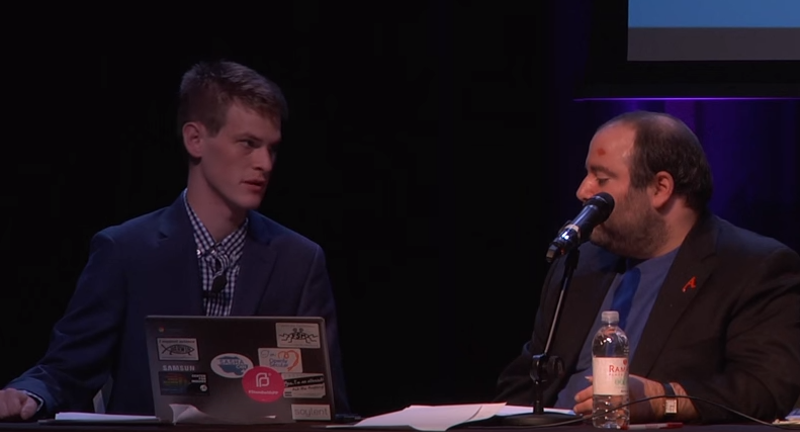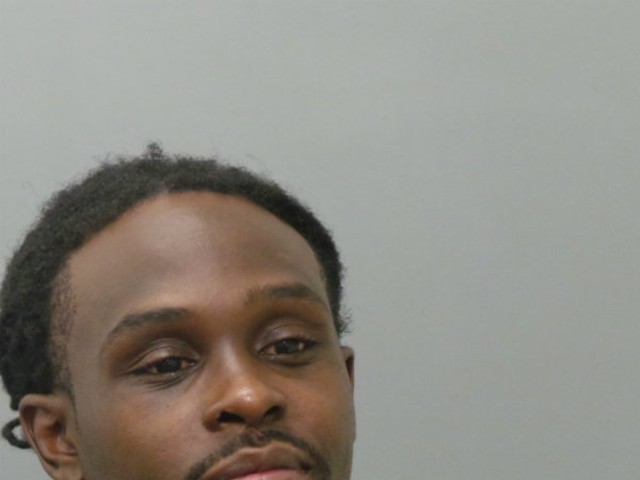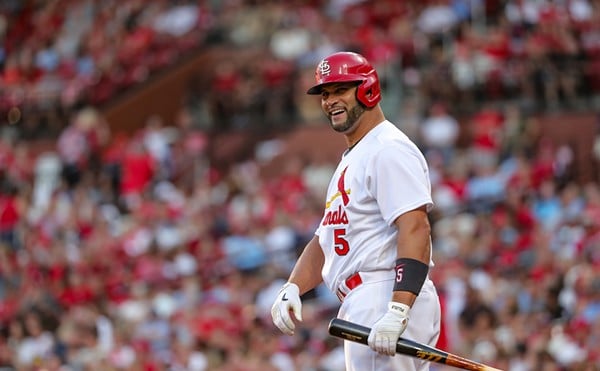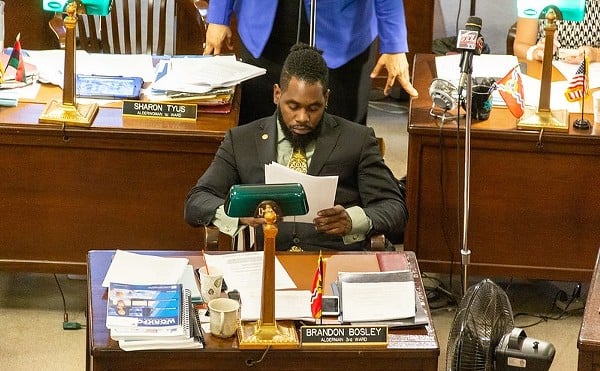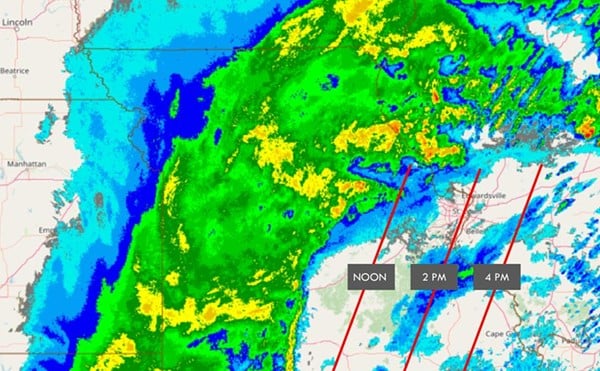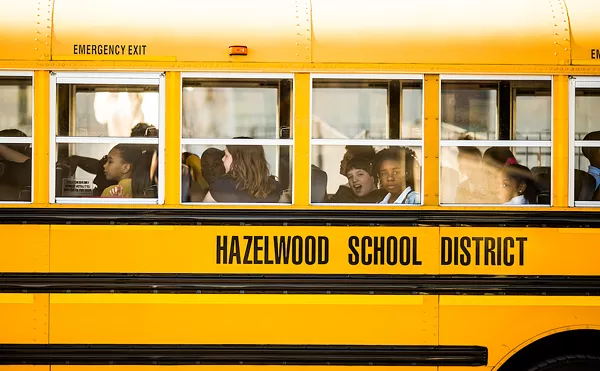Undoubtedly, there were good intentions behind last week’s Skepticon 8 session, “Q&A with University of Missouri Protest Videographer Mark Schierbecker.” The talk, held at the annual Missouri-based convention for skeptics and seculars, was ostensibly conceived to address events surrounding last week’s resignation of Missouri System President Tim Wolfe — but instead, it turned into something resembling a public flogging.
The first 25 minutes of the session breezed by. The session featured only two panelists: Schierbecker, who'd gained national attention after covering the protests at Mizzou, and his publicist Danielle Muscato. Muscato did most of the talking.
Muscato restated the basic facts behind the protests, leading up to the confrontation in which Schierbecker, a student photojournalist, was physically blocked from entering a protest zone by Mizzou assistant professor Melissa Click. Muscato had pitched the event to the Skepticon organizers as an opportunity to discuss the protests and related debates over free speech and the First Amendment rights of journalists.
Minutes before the panel’s scheduled conclusion, Schierbecker took one last question from his publicist.
"Mark, I'm going to ask you a direct question and I'm sorry if this is uncomfortable but I need you to answer this,” Muscato said from her seat next to Schierbecker onstage. “Are you racist?"
That was the moment the session spun off the rails.
The ensuing 50 minutes produced a remarkably frank (and at times deeply awkward) conversation between Schierbecker, Muscato and members of the audience, several of whom hounded Schierbecker for his decision to pursue assault charges against Click. Further complicating matters was Moscato's failure to bring even one representative of Mizzou’s black protest movement, Concerned Student 1950, to the session. That left two white people on a stage discussing issues that needed to include black voices, some audience members argued.
Three hours after the event, Muscato released a public statement on Facebook. She wrote that Schierbecker had said “multiple indefensibly racist things” during the Q&A and that his remarks made it impossible for her to stay on as his publicist.
“I attempted to give Mark several chances to clarify his apparently racist remarks as not racist, but in my opinion, I was unsuccessful,” Muscato wrote in the November 14 post. “I made a mistake in hosting this session. This should not have gone forward without #ConcernedStudent1950 voices.”
Indeed, the latter point might be the only thing all sides agree on: The session should never have taken place.
Before the footage of an angry Click made national headlines, Schierbecker’s journalistic resume amounted to little more than than his work as a senior staff photographer for The Maneater, the student-run newspaper at the University of Missouri - Columbia.
But on November 9, the 22-year-old Schierbecker was on the Mizzou quad when student activists locked arms around the tent encampment of Concerned Student 1950, the core protest group. The protesters demanded that media leave the area.
Schierbecker kept his camera rolling, even as he engaged in verbal spats with the students around him and, minutes later, when Click grabbed at his camera. He filmed while Click asked other students to bring “some muscle over here” to eject the reporters from the newly christened “safe space.” (Under fire from politicians and pundits, Click has since apologized for her actions.)
Schierbecker uploaded a six-minute clip of the confrontation to YouTube, and the video became a viral sensation. Editorials and columns across the country (including Riverfront Times) criticized Click for blocking reporters just trying to do their jobs. And although Concerned Student 1950 amended their “no media” policy just one day later, the protesters and their allies groused that the thin-skinned media had made themselves the star of the story, thereby deflecting attention from the racism and disenfranchisement experienced by Mizzou’s black students.
Schierbecker was swamped with interview requests. On November 11, he tweeted that he’d gained a publicist — Danielle Muscato, whose website describes her as an “atheist activist, writer, debater, pundit, musician, and transgender woman.” Muscato, in a later tweet, called Schierbecker a “longtime friend.”
Most of the people who wanted to talk to Schierbecker didn't share his publicist's politics. On November 12, Schierbecker appeared on Fox News and was quoted by conservative website Brietbart lambasting the protest movement and its initial suppression of journalists. That same day, Schierbecker told Reuters that he would press charges against Click for assault.
That was also the day Muscato announced via tweet that she was looking for protesters to appear on a panel that weekend at Skepticon 8.
Dear @CS_1950 & friends—anyone who was at the protest—we want to hear your voice! Panel Saturday in Springfield MO https://t.co/sNfcLqnm5S
— Danielle Muscato (@daniellemuscato) November 12, 2015In a post to her personal Facebook page, Muscato wrote: “I would like AT MINIMUM one person from #ConcernedStudent1950, and/or one of the people camping out on Mizzou's campus this week, and/or one of the demonstrators, to join this panel. If needed, I can help you arrange transportation and hotel space.”
Muscato was unsuccessful in her efforts. Still, on November 13, she and Schierbecker drove to Skepticon 8 together. Despite the lack of black protesters for the event, the conference’s organizers let the session take place as planned. That decision would prove to be disastrous.
Which brings us back the question Muscato leveled at Schierbecker: Are you racist?
“Everybody is a little bit racist,” Schierbecker's answer began. “Everyone has prejudices that manifest themselves in public-facing situations. The Mizzou students have legitimate grievances because of this, it is a very white campus. Yes, I have white privilege, and as a white person it is my duty to use my white privilege in a way that can result in fewer white privileges in the future and greater equality across the board.”
Muscato prodded further, asking Schierbecker what he could do as a student and a journalist to address racism on campus. Schierbecker answered that “the best anyone can do” is to acknowledge racism’s existence in everyday life. He added the protest movement is doing “good work” but that journalists should not be curtailed in documenting the historic moment.
But the session didn’t end after its allotted 30 minutes. Diane Burkholder, a Kansas City-based activist in the audience, rose from her seat and asked why Schierbecker and Muscato had produced a “scripted” event that seemed geared toward burnishing Schierbecker’s image.
“If the point is to uplift and validate the perspective [of] black students, particularly the black students of Mizzou, I find it highly problematic that the point of this is to uplift your narrative as a white male entering a black space,” she said. “If you're going to uplift black people, uplift that and don't make this about yourself.”
A man in the audience pointedly asked Schierbecker to address how the video was being used by conservative media; they were painting the protest movement as a collection of whining, expression-quashing bullies. The video had even turned up on a forum on Stormfront, an explicitly white supremacist website, the man pointed out.
Schierbecker answered that journalists “are trying to as best as we can to represent the situation as fairly as possible, we're not hijacking the movement to advance our dialogue” about free speech.
However, Schierbecker did apologize for “pandering to Breitbart," which had quoted him calling Click and other protesters “coddled liberal arts majors.”
In the ebb and flow of questions and answers, a theme began to emerge. Various audience members wanted Schierbecker not only to acknowledge that his video had overshadowed black students’ efforts at fighting racism on campus, but to take responsibility for a direct role in weakening the movement. Didn’t he realize that by pressing charges against Click (and publicly refusing to accept her apology) he was actively diverting news coverage from real issues? Shouldn’t the moral obligation to fight oppression and reduce suffering trump the challenges faced by one journalist?
Next: The questions get harsher.

